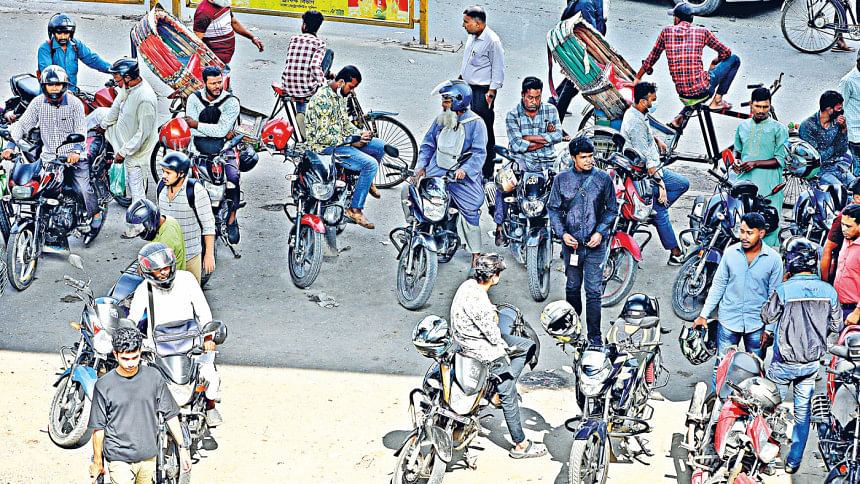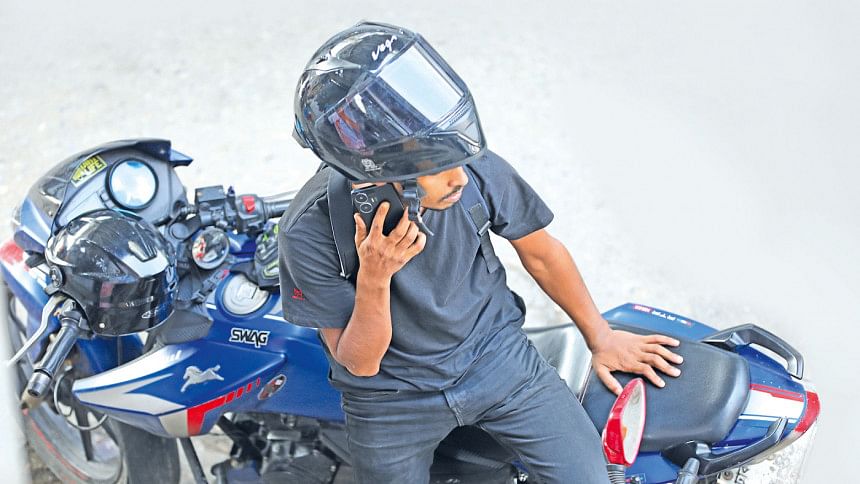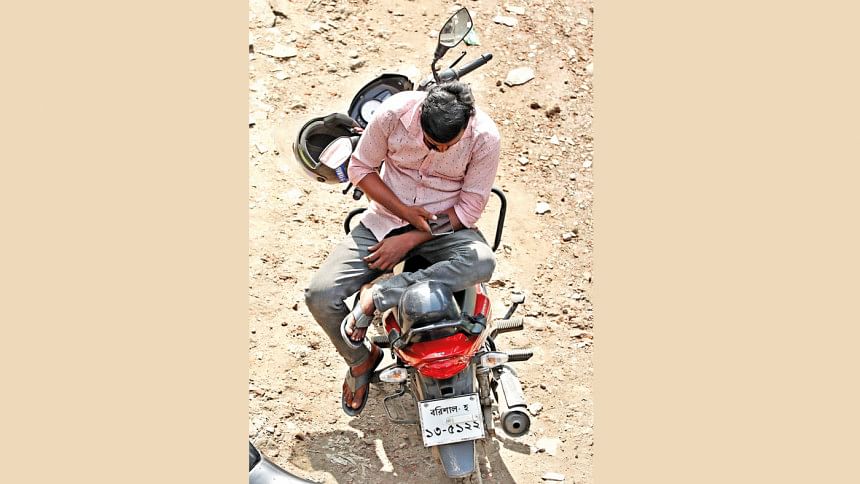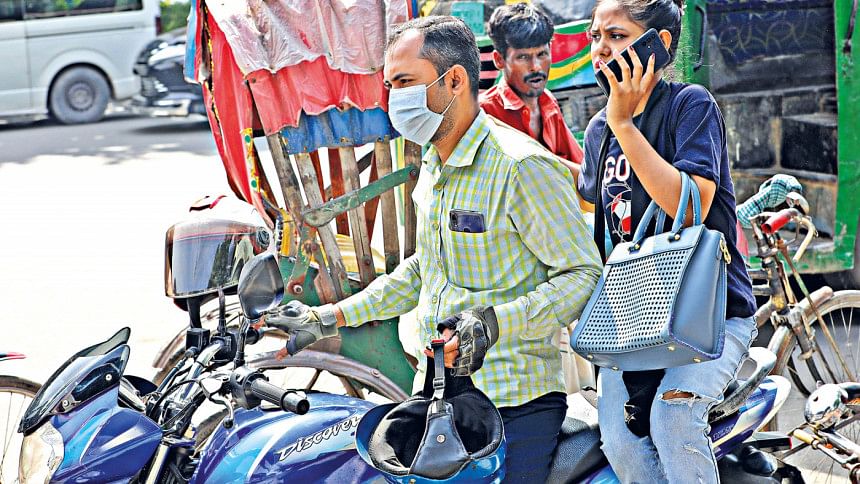Inside the lives of ride-sharing drivers

On the bustling streets of Dhaka, where traffic moves like molasses and the air hangs heavy with exhaust fumes, a new breed of urban warriors has emerged. They navigate the city's chaotic arteries on two wheels, smartphones mounted on their handlebars, chasing the next ride.
These are Dhaka's ride-sharing drivers, and their stories reveal both the promise and precarity of the gig economy in Bangladesh's capital.
Navigating life on Dhaka streets
Mohammad Rahat Mia's day begins before the sun rises. At 25, he is already juggling multiple roles: student, office worker, and ride-sharing driver.
"I wake up at 6 in the morning," he said. "By 6:30, I'm on the road, trying to catch 2-3 early morning passengers for that first 500-600 taka."
Like many others, Rahat turned to ride-sharing to supplement his meagre office salary of Tk 14,000. But what started as a side hustle has become a lifeline for his family.
As the youngest of four siblings, circumstances forced him to take on the role as his mother's primary caretaker after his father's passing.
"The expenses never end," he lamented, counting them off on his fingers, "Tk 4,000 for rent, Tk 7,000 for food, a few thousand for motorcycle instalments, plus Tk 14,000 in annual college fees."
According to the Bangladesh Road Transport Authority (BRTA), there were 43 lakh registered bikeriders in the city till January 2024.
Among them, individuals like Rahat often turn to the gig economy as a means of financial survival. The flexibility and earning potential of ride-sharing provide a lifeline, enabling them to support their families while juggling multiple responsibilities.
For others, it is a quick way to supplement their earnings.

However, despite the promise of increased income, these drivers navigate a precarious landscape, one teeming with challenges that highlight the complexities of their choice to pursue this alternative employment path.
"Getting selected for a secure government job is very tough nowadays, though I am still preparing for the exams. I will continue this informal job till then," Rahat added.
Between dreams and reality
The story of economic pressure forcing young people to sacrifice their education is a common one. Rahat lays this reality bare, explaining that he can rarely attend his college classes now.
"I can't attend classes as I need money," he said. "I just sit for the exams."
For older drivers like Tamal, 43, ride-sharing offers a different opportunity.

Despite owning a house in Mirpur and having a stable primary income, he sees ride-sharing as a way to maximise his earnings.
"I do this with my own car for some extra income," he said.
However, even for relatively solvent drivers like Tamal, challenges persist. "Extortion on the streets is a problem with the police," he admitted, though he's quick to add, "But there is nothing to say about this.
"We do not have any forum to talk about our demands and rights. This is urgently required as many young people like us are involved in such jobs," he suggested.
Ramadan brings additional challenges for these road warriors, according to Imran Ahmed, 35, who has been traversing these challenges since 2018.
"The relentless heat beats down on me, sapping whatever energy I have left," he said, describing his daily struggle during fasting hours.
Basic necessities become major hurdles, he added, "There are very few fully functional public toilets in Dhaka, which causes problems. Also, I do not have a proper place to break my fast."
The price of progress
For Robin Hasan, 26, the decision to hop on the ride-sharing wave was born of necessity.
With his family entirely dependent on him, he needs to earn Tk 30,000-Tk 40,000 monthly.
"I do this job to earn a little more because my family is totally dependent on me," he explained.
"Sometimes I can earn Tk 1,500 in a day, but if luck is not on my side, then it's impossible to make Tk 500 as there are many drivers now.
"If I work through apps, I need to pay for subscriptions. It's like paying without earning, which is troublesome. Ultimately, corporate companies get their profit. Moreover, app-based services offer fares on a very low scale. So, it is beneficial if we go on a contractual ride and cut out the app," Hasan added.
For him, using ride-hailing apps to book fares is always the last resort. Even then, he generally only relies on apps to locate customers. After connecting them, he disables the app and negotiates a direct deal.
Colloquially known as "khep" in Bangladesh, this method describes the practice of gig drivers side-stepping platforms like Pathao and Uber to find work directly.
Many such riders can be found strewn along major roads in the capital, calling out to potential passengers, sometimes even negotiating fares on the fly.
Literally, the term translates to "side hustle", highlighting the informal nature of these dealings and the drivers' goal of maximising earnings by eliminating the middleman.

"Although there are government guidelines, they are very corporate-owner friendly," Hasan said.
Despite the demanding nature of the task, the industry has changed dramatically since its fledgling days, with riders proliferating in recent years.
This change has coincided with a sharp rise in unemployment among graduates and the youth.
Despite a decline in the country's overall unemployment rate between 2016 and 2022, the share of unemployed tertiary-educated youth within the total unemployed population in Bangladesh increased to 27.8 percent in 2022 from 9.7 percent in 2013, according to the World Bank.
According to the Bangladesh Bureau of Statistics, graduates also remain unemployed for a long time, as nearly 20 percent wait for two years for a job, while 15 percent remain jobless for more than two years.
During these periods of uncertainty, youths have little choice to earn a living.
Rahat recalls: "In the beginning, the income in a month was Tk 70,000-Tk 80,000 if you worked the whole day. But as riders have flooded the market, earnings have dwindled. Now, full-time drivers typically earn between Tk 30,000-Tk 50,000 monthly, while part-timers make Tk 12,000-Tk 15,000."
Beyond financial challenges, these drivers face physical and environmental hazards daily.
"We have to stay outside all day, the air quality is bad, noise pollution is ever-present and we burn in the scorching heat, harming our bodies" Rahat detailed.
The spectre of road accidents also looms large over every shift.
The BRTA reported at least 4,153 deaths in 4,494 road crashes nationwide in the first nine months of last year, both up 10 percent year-on-year.
The reasons for this chiefly include lax standards of law enforcement, with a huge number of illegal and sub-standard vehicles continuing to operate on roads unabated.
The general reluctance to follow traffic laws, including speed limits, is another major reason for road crashes.
"An accident on the road is the biggest fear," Rahat admitted. "Everyone drives recklessly. Even if there is an accident, there is no one to see."
This correspondent spoke with 18 ride-sharing drivers who expressed concerns about current government guidelines, their medical benefits, and the need to designate areas as stands.
Addressing the wage system and contract format, Sitangshu Shekhar Biswas, director (engineering) of BRTA, said: "We are working to revise the contract system and wages, which is a significant issue, in line with our existing guidelines to benefit the workers. However, this applies only to those who engage in ride-sharing services under agreements with companies. We cannot implement official measures for those operating privately."
Regarding medical benefits, he noted that since these drivers are not permanent employees of any company or government entity, it is unfeasible to extend all benefits typically available to permanent workers.
He also explained that if designated locations were established for drivers, their vehicles would need to remain mobile to pick up and drop off passengers, making it impractical to assign a specific location at this time.
Speaking of the commission and rider's income, Fahim Ahmed, CEO of Pathao, said: "We offer our drivers the highest earnings potential through low commissions, performance-based incentives, and the ability to utilise idle time effectively. Our commission structure rewards high performance, with rates dropping as low as 1 percent."

"To maximise their income, we provide lucrative bonuses in the morning to help them start their day with the highest earnings potential and offer commissions as low as 1 percent upon performance to ensure maximum earnings throughout the day," Ahmed added.
"Mandatory subscription fees do not work in our country because we are prone to disruptions -- be that due to weather or economic or political turmoil. We care for our riders' earnings, which is why we provide them with the opportunity to maximise their income upon high performance through dynamic commissions and parcel deliveries."
As for healthcare facilities, he only mentioned that they are the first and only platform in the country to offer safety coverage to both users and riders.
Uber did not respond to The Daily Star's request for comments.
Hope amid hardship
In light of such challenges, many drivers see ride-sharing as a temporary solution rather than a career.
They dream of better jobs, further education, and more stable futures. As Rahat puts it: "Even if there is no future in this job, I can do it because I am young. But I can't do it when I get a little older."
Policy Analyst Ananya Raihan, chief executive officer of Infolady Social Enterprise Limited, said most of these drivers come from other cities to Dhaka.
"This is an alternative employment opportunity for them. But the challenge is that the work environment, working hours, and overtime are very exploitative. There are many health hazards, most of which do not have any kind of insurance coverage. They have to do a lot of work to earn a living wage. The long-term impact is it is another kind of sweatshop, but in the form of digital labour," he said.
"Some of the employment problems are mitigating at the macro level. But it is a waste of talent and human resources," Raihan opined.
"The industry is a reason for domestic migration also. People are moving towards Dhaka as it provides a good opportunity for educated youth, especially those in national universities. So, there is definitely positive social mobility."
Speaking of the guidelines, he said it should be scrapped entirely.
"The present reality is different. This guideline does not mention the workers who work, rather it focuses more on the owner's perspective," he said.
"There is no security in this informal job. If rules and regulations can be put in place to protect workers, there may be a positive impact."
These digital-age drivers represent a new kind of urban workforce: educated, tech-savvy, but caught between aspiration and necessity. Their stories reflect broader changes in Bangladesh's urban economy, where traditional career paths are giving way to more flexible -- but often more precarious -- forms of employment. As they navigate Dhaka's congested streets, they're also navigating their way toward what they hope will be a better future.

 For all latest news, follow The Daily Star's Google News channel.
For all latest news, follow The Daily Star's Google News channel. 








Comments